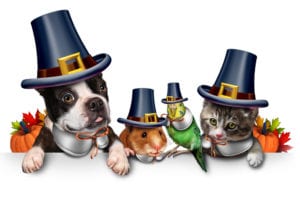 Happy Thanksgiving to the entire AZPetVet family!
Happy Thanksgiving to the entire AZPetVet family!
This year, as you celebrate the holiday with family and friends, remember that temptations abound for everyone – including your pets. There’s no need to leave your pets out of the festivities – just be careful about the types of food they eat and make sure they do not overindulge.
No under the table treats please! Fatty foods can cause some nasty digestive problems for your pets, so be sure to keep them out of reach.
Your trash container is also going to be filled with a variety of scraps, foil, plastic wrap, and food waste that could harm your pet if they get into it. Keep all trash containers well covered and away from pets – behind closed doors if possible.
Here are the DOs and DON’Ts for pets and holiday foods:
The NO NO List
– Turkey – while small amounts of skinless meat can be safe, it’s best to avoid
– Stuffing – chock full of ingredients that can harm your pet
– Mashed potatoes – too much butter and other fats
– Candied yams – too much sugar, butter and other fats
– Gravy – far too rich for pets’ tummies
– Candy – especially chocolate
– Pie or other desserts
SAFE & YUMMY
– Green beans (plain, steamed or boiled)
– Baby carrots (raw or cooked)
– Apple slices (small, thin slices)
– Celery – add a smear of natural, unsalted creamy peanut butter
– Plain pumpkin puree (not pie filling)
WATCH OUT
If you see sudden changes in behavior, depression, pain, vomiting, or diarrhea in your pet, contact your veterinarian immediately.
If you believe your pet has been poisoned or has eaten something it shouldn’t have, call your veterinarian or local veterinary emergency clinic immediately.
ASPCA Poison Control Hotline: 888-426-4435

